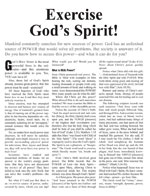Ben and John dare each other to jump off a bridge. Lauren and Julia race down Main Street, pushing their cars to the limit. Ken, afraid of what others might say if he chickens out, jumps into a freezing lake in the middle of February.
These are all examples of recklessness, young people gambling with their health and lives. Each of them points to different reasons for running risks. Some want to be accepted; some want to win. Others simply want to prove their worth, and still others are afraid of what people might think. However, those in such situations often underestimate the dangers involved.
Being Accepted
People generally want to fit in, be accepted and appreciated. For younger individuals, this often means “being cool.” Generally, this equates to not caring and a lackadaisical attitude. Ironically, those who try to be “cool” are often ridiculed for “trying too hard.” How frustrating and confusing this is for so many!
Likewise, in shameless attempts to please the whims of their friends and peers, people yield to the group’s mentality. Whatever is popular is deemed right. If “everybody else” is doing something, and one is not, this means “something is wrong with him.” Many give in to this way of thinking and cast aside caution, reason, prudence and concern in order to gain acceptance.
Then there are those who, also wanting to be appreciated, push the group and themselves to the limit. They want the reputation of being bold, tough and fearless. They cast aside concern for the consequences and rush headfirst into every obstacle.
Foolishness
Pushing the trend of mindless showmanship even further, it has become fashionable to perform outrageous and absurd acts in order to be “funny.” Many TV shows glorify this mentality, such as the popular one on MTV in which the goal is to engage in wild tricks and pranks to confuse and confound as many as possible. Most of these pranks simply involve “acting like an idiot.”
This is not the only show of this sort. In others, people must complete wild “dares.” Sometimes they do this for money, sometimes not. People eat insects, worms and other disgusting creatures. They take death-defying risks. They wrestle with each other. They have contests of every sort—spitting contests, contests of gorging on absurd amounts of food, burping contests, swearing contests and every other kind of degenerate activity under the sun.
These stunts were once confined to children too young to know any better—small children looking for attention. It is ironic that what was once correctly viewed as the behavior of an immature child in need of correction is now prime time entertainment.
Competition and Fear
In addition to the desire to fit in, receive attention and appreciation, many engage in dangerous behavior simply because they want to win a competition. Pushing themselves beyond reasonable limits, teens and young adults often find themselves risking serious injury in order to win. Being young, healthy and full of energy, caution is thrown to the wind. However, many never consider what might happen that one time when things do not work out.
Many others push themselves toward injury and run unreasonable risk simply because they fear the criticism of their peers. To some, the sting of criticism is far more painful than injury; they would rather endure broken bones, injured bodies and maybe even face death than hear painful words. But, they do not realize that learning to deal with criticism will make them stronger, and emotional injuries, when properly dealt with, are temporary. However, damage to the body can be permanent.
Prudence
Think. What is the value of your body—your arms, your legs, your hands, your feet, your eyes, your ears, or your heart? Will it matter how cool you are when you break your legs jumping off that bridge? Will the victory taste so sweet when you win the street race with your fast car—but lose your arm in a wreck at the finish? Will avoiding the mocking of your peers by not wearing safety glasses be worth it when you lose your eyesight?
When young and healthy, it is easy to forget how fragile your body is. When everything is going your way and life couldn’t get any better, it is hard to imagine that the next moment your life could fall apart. What people sometimes fail to realize is that it only takes one mistake—one time that you push yourself too far—to face serious consequences.
In order to correctly deal with these pressures and avoid the dangers, young people need to learn prudence. Prudence means exercising caution, discretion, having regard for one’s own interests and care in managing personal resources.
God has many words to say to the young man (and the young woman) about learning prudence and discretion. Solomon is used to describe one of the purposes of the book of Proverbs: “To give subtilty to the simple, to the young man knowledge and discretion” (1:4). As a young person, this verse should strike you. If God is saying that a young man needs to be given knowledge and discretion, then it is clear that young men do not already have it. In fact, since God lists this as one of the main purposes of Proverbs, this must mean that youth have an urgent need to learn discretion.
Now let’s examine a number of other verses from Proverbs concerning prudence: “A fool despises his father’s instruction: but he that regards reproof is prudent” and “a prudent man foresees the evil, and hides himself: but the simple pass on, and are punished” (15:5; 22:3).
Of course, the Bible has much more to say on the subject of prudence. But here are two major principles: First, in order to avoid being a fool, one must learn to listen to instruction. Other people have had different experiences than you, and if you want to avoid making the same mistakes, you must take the time to listen to the lessons they have learned. Second, to avoid the cost of rash decisions and negligence, one must learn the simple principle of being circumspect—looking for problems that might occur and planning ahead to avoid them.
Tempting God
One final excuse for rash behavior needs to be discussed. Many in God’s Church have had the idea that if they are doing something that is correct—or something God approves—then they are exempt from the need to be cautious. For example, some may believe that they can speed excessively on the way to Sabbath services in order to increase their time for fellowship. Others believe they do not have to worry about anything, because no matter what happens, God will protect them. However, God is not required to protect you just because you are doing something good. In fact, to throw caution to the wind in such circumstances is directly disobeying one of His commands: “You shall not tempt the Lord your God” (Deut. 6:16; Matt. 4:7).
If you knowingly put yourself in a dangerous situation, and do not take the necessary precautions that you should, you are tempting God. God does not promise to protect you in such situations, and quite often you will have to deal with the consequences.
Balance
This is not to say that you should spend your life in fear of what might happen to you. God promises to protect you if you are taking necessary precautions. Nearly everything in life involves some risk. You cannot spend your life as a hermit, hoping you will never encounter danger, nor should you worry excessively about what might happen. Simply take the necessary precautions, do your part, and God will do His.
By avoiding reckless, rash, foolish behavior, you also avoid its consequences. Learn prudence, and do not get caught up in excessive concern over what your peers might think or in trying to be better than everyone else. Within these boundaries, you can have fun, enjoy life, try your hardest, learn and grow.


















